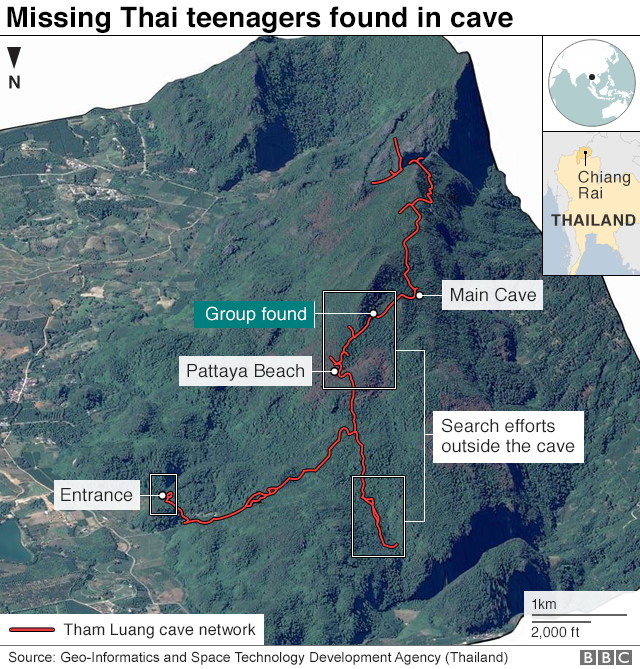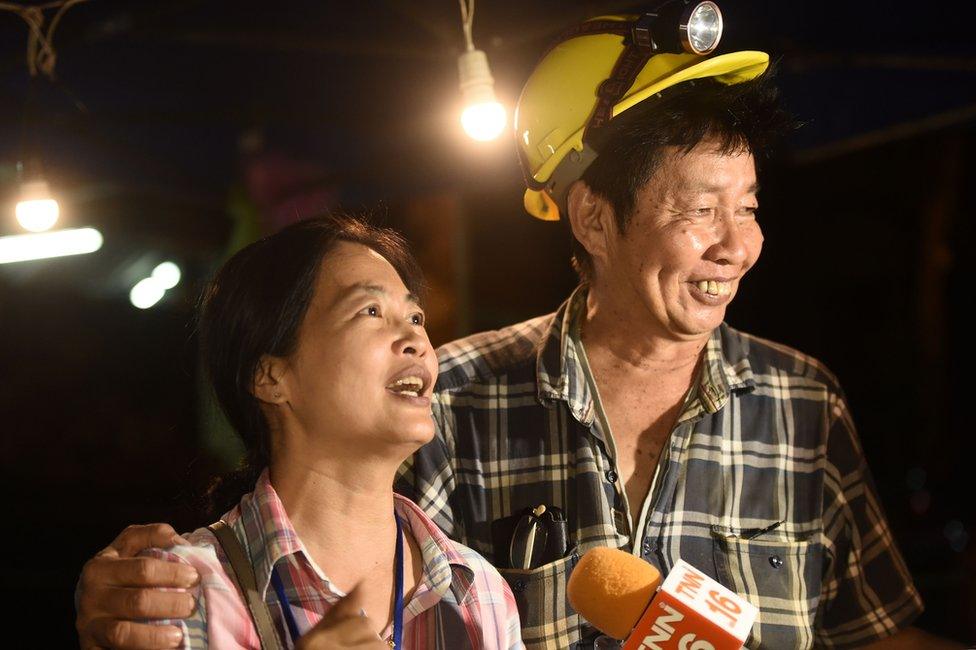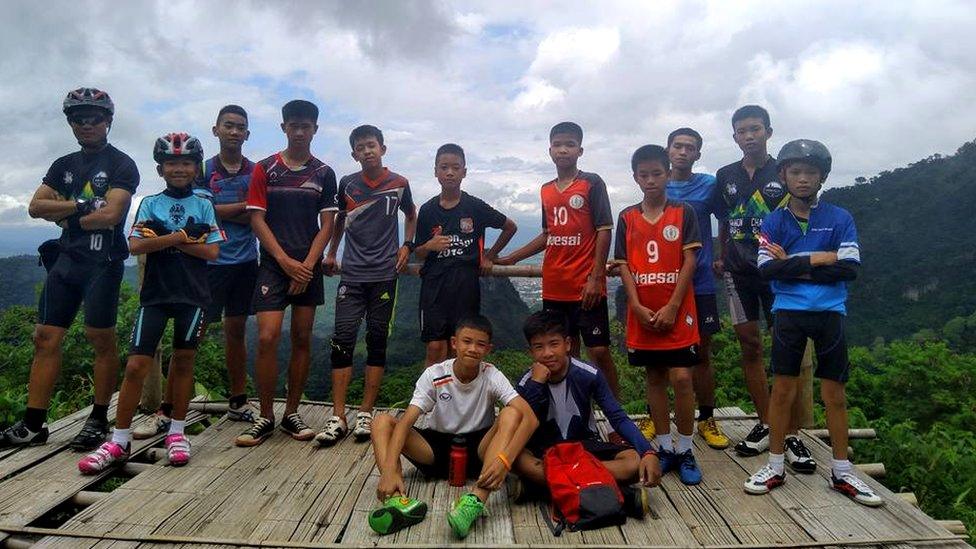Thailand cave rescue: Boys found alive after nine days
- Published
Finding the Thai cave boys and getting them out
Twelve boys and their football coach missing in caves in Thailand for nine days have been found by divers, in a drama that has gripped the nation.
They were discovered by two British divers on a ledge in a cavern after a marathon search operation in the Tham Luang caves in Chiang Rai.
The challenge now will be to extract the party safely, with rising water and mud impeding access.
Families of the missing group were ecstatic at news of the rescue.
Rescuers had hoped they would find safety on a ledge in an underground chamber nicknamed Pattaya Beach but they were found 400m (440 yards) away having moved to higher ground to avoid the rising water.

There was jubilation among family members camping near the caves
How did they find them?
The two British rescuers are believed to be Rick Stanton and John Volanthen, who arrived in Thailand early last week.
It took them several hours to reach the group on Monday.
In video posted on Facebook by Thai Navy SEAL special forces, external, one can be heard speaking in English to the group, as they sit on a ledge above water in a cavern, picked out by torchlight.
"How many of you?" the rescuer asks.
"Thirteen!" comes the reply.
"Thirteen? Brilliant!"

The group appear to ask when they will be taken to safety and one of the unseen rescuers replies: "Not today. There's two of us. We have to dive. We are coming. OK? Many people are coming. We are the first."
One of the boys is heard to say: "Eat, eat, eat, tell them we are hungry."
When the group, whose voices are indistinct, ask what day it is, the divers pause, then one replies, "Monday, Monday. You have been here... 10 days. You are very strong."
The divers explain that they have to leave but will be back.
"Thank you so much," says one of the huddled group. "Where you come from?"
"England. The UK."
"Oh. See you tomorrow."
The group's plight has gripped the country and led to an outpouring of support.
The boys aged 11 to 16 and their coach went to explore the caves on 23 June.

An uplifting breakthrough
By Jonathan Head, BBC News, Tham Luang
There are scenes of jubilation here at the cave entrance - drowned out by the generators powering the water pumps and filling the air tanks for the dozens of divers whose persistence in the toughest of underground conditions has paid off.

Family members celebrated near the cave
Now the authorities must figure out how to extract them. The first priority is to get them medical treatment and food where they are, to rebuild their strength.
The whole country has watched every stage of this operation, holding its breath for what seemed an increasingly unlikely happy ending.
They are not out yet but this is an uplifting breakthrough after the Thai government threw everything it could at the effort to save these boys' lives.
Who are the 13?

A Facebook photo shows the coach with some of the missing children
The 12 boys are members of the Moo Pa - or Wild Boar - football team.
Their 25-year-old assistant coach, Ekkapol Janthawong, is known to have occasionally taken them out on day trips - including a trip to the same cave two years ago.
The youngest member, Chanin "Titan" Wibrunrungrueang, is 11 - he started playing football aged seven.
Duangpet "Dom" Promtep, 13, is the team captain and said to be the motivator of the group.
Tinnakorn Boonpiem, whose 12-year-old son Mongkol is among the 13, told AFP news agency near the caves she was "so glad" to hear they were safe.
"I want to him to be physically and mentally fit," she said.
"I'm so happy I can't put it into words," another relative of one of the group told reporters as tears of joy streamed down his cheeks.
What challenges lie ahead?
"They are all safe but the mission is not completed," Chiang Rai governor Narongsak Osottanakorn told a press conference at the command centre at the cave entrance.
"Our mission is to search, rescue and return. So far we just found them. Next mission is to bring them out from the cave and send them home."
The governor said they would continue to drain water out of the cave while sending doctors and nurses to dive into the cave to check the health of the boys and their coach.
"If the doctors say their physical condition is strong enough to be moved, they will take them out from the cave," he said. "We will look after them until they can return to school."
Edd Sorenson, a regional co-ordinator in Florida for the International Underwater Cave Rescue and Recovery Organisation, advises against trying to get the party out through the flooded caves using scuba gear.
Footage from the Thai Navy shows rescuers at the Tham Luang caves in Chiang Rai
"That is extremely dangerous and hazardous, and I would consider that an absolute last resort," he told the BBC.
"Having somebody in zero visibility that's not familiar with ... that kind of extreme conditions, it's real easy and very likely that they would panic, and either kill themselves and or the rescuers.
"So at this point, you know, I think they would be better off bringing in food, water, filtration systems, oxygen if the air space needs it and requires it, and at least they have lights and hope now, so I think waiting it out, as long as they can get supplies in there to make them comfortable and warm and fed and hydrated."
More than 1,000 people have already been involved in the operation, including teams from China, Myanmar, Laos, Australia and the US, as well as Britain.